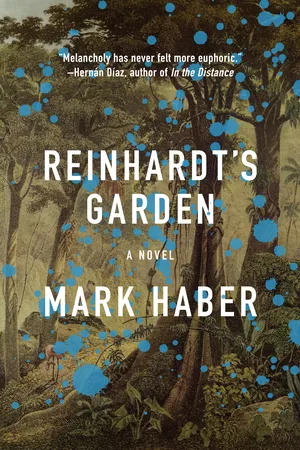eBook - ePub
Reinhardt's Garden
About this book
In this delightfully dense, fast-paced comedy with notes of László Krasznahorkai and Saul Bellow, Jacov and his scribe cross continents in search of the legendary prophet of melancholic philosophy.
At the turn of the twentieth century, as he composes a treatise on melancholy, Jacov Reinhardt sets off from his small Croatian village in search of his hero and unwitting mentor, Emiliano Gomez Carrasquilla, who is rumored to have disappeared into the South American jungle—“not lost, mind you, but retired.” Jacov’s narcissistic preoccupation with melancholy consumes him, and as he desperately recounts the myth of his journey to his trusted but ailing scribe, hope for an encounter with the lost philosopher who holds the key to Jacov’s obsession seems increasingly unlikely.
From Croatia to Germany, Hungary to Russia, and finally to the Americas, Jacov and his companions grapple with the limits of art, colonialism, and escapism in this antic debut where dark satire and skewed history converge.
At the turn of the twentieth century, as he composes a treatise on melancholy, Jacov Reinhardt sets off from his small Croatian village in search of his hero and unwitting mentor, Emiliano Gomez Carrasquilla, who is rumored to have disappeared into the South American jungle—“not lost, mind you, but retired.” Jacov’s narcissistic preoccupation with melancholy consumes him, and as he desperately recounts the myth of his journey to his trusted but ailing scribe, hope for an encounter with the lost philosopher who holds the key to Jacov’s obsession seems increasingly unlikely.
From Croatia to Germany, Hungary to Russia, and finally to the Americas, Jacov and his companions grapple with the limits of art, colonialism, and escapism in this antic debut where dark satire and skewed history converge.
Tools to learn more effectively

Saving Books

Keyword Search

Annotating Text

Listen to it instead
Information
Table of contents
- Cover
- Title Page
- Copyright
- Dedication
- Reinhardt’s Garden
- Funder Acknowledgments
- The Publisher’s Circle of Coffee House Press
Frequently asked questions
Yes, you can cancel anytime from the Subscription tab in your account settings on the Perlego website. Your subscription will stay active until the end of your current billing period. Learn how to cancel your subscription
No, books cannot be downloaded as external files, such as PDFs, for use outside of Perlego. However, you can download books within the Perlego app for offline reading on mobile or tablet. Learn how to download books offline
Perlego offers two plans: Essential and Complete
- Essential is ideal for learners and professionals who enjoy exploring a wide range of subjects. Access the Essential Library with 800,000+ trusted titles and best-sellers across business, personal growth, and the humanities. Includes unlimited reading time and Standard Read Aloud voice.
- Complete: Perfect for advanced learners and researchers needing full, unrestricted access. Unlock 1.4M+ books across hundreds of subjects, including academic and specialized titles. The Complete Plan also includes advanced features like Premium Read Aloud and Research Assistant.
We are an online textbook subscription service, where you can get access to an entire online library for less than the price of a single book per month. With over 1 million books across 990+ topics, we’ve got you covered! Learn about our mission
Look out for the read-aloud symbol on your next book to see if you can listen to it. The read-aloud tool reads text aloud for you, highlighting the text as it is being read. You can pause it, speed it up and slow it down. Learn more about Read Aloud
Yes! You can use the Perlego app on both iOS and Android devices to read anytime, anywhere — even offline. Perfect for commutes or when you’re on the go.
Please note we cannot support devices running on iOS 13 and Android 7 or earlier. Learn more about using the app
Please note we cannot support devices running on iOS 13 and Android 7 or earlier. Learn more about using the app
Yes, you can access Reinhardt's Garden by Mark Haber in PDF and/or ePUB format, as well as other popular books in Literature & Literature General. We have over one million books available in our catalogue for you to explore.
